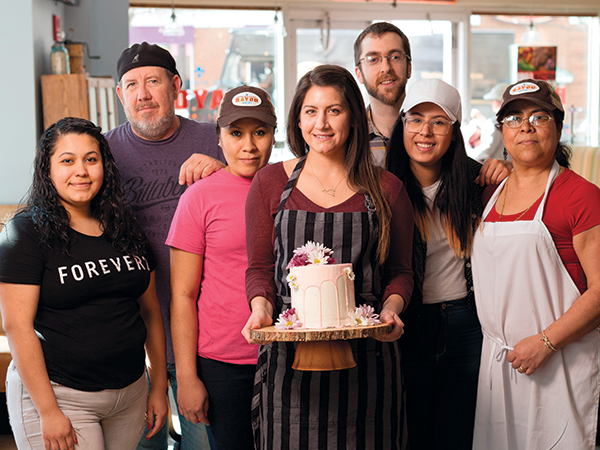
Bayou Bakery pastry chef Tressa Wiles (center) with (from left): Estefany Montesinos, Mike Cody, Dilia Liseth, Blair Calhoun, Khawla Gasmi and Dolores De La Cruz.
Tressa Wiles, Bayou Bakery
In the five weeks leading up to Mardi Gras this year, pastry chef Tressa Wiles made more than 1,000 king cakes. That was in addition to her baking staff’s normal output at Bayou Bakery—which on a busy Saturday or Sunday includes around 300 beignets, 200 biscuits and umpteen muffins, croissants, brownies, pralines, cookies, bars and layer cakes.
Growing up in rural Gainesville, Virginia, before the Food Network craze, Wiles never imagined that making desserts could be prestigious. But she liked baking and thought it would be fun to make wedding cakes. A friend suggested she try out the nearby culinary school.
In 2006, she completed Stratford University’s 16-month pastry program in a mere nine months, taking classes at Reagan National Airport in a corner of the same kitchen where in-flight meals were prepared. (This was before Stratford had a dedicated pastry kitchen.) Noting her ability, an instructor suggested she apply to work at 2941 Restaurant in Falls Church and put in a good word for her.
“I wound up staying at 2941 for three years,” says Wiles, now 27. “When I started, the sous-chef told me to peel a mango and I had no idea what it was. It was mind-blowing learning the science and seeing art on a plate. We didn’t have soufflés in Gainesville. We had ice cream and that was it.” (She’s since received a Restaurant Association Metropolitan Washington RAMMY nomination for “Pastry Chef of the Year.”)
In 2009, Wiles went to New York City and landed a brass-ring job at vaunted Eleven Madison Park. After stints with a catering company in Brooklyn and a year working as a pastry chef in Australia, she returned to Northern Virginia just as Bayou Bakery’s head baker was preparing to leave.
Now she lives in Del Ray and oversees all of the baking operations for David Guas’ New Orleans-inspired eatery—working three days a week in its Courthouse location and three in D.C., from 5 a.m. to around 4 p.m. “Oddly enough, I don’t eat a lot of sweets,” she says. “But I sure love making them.”
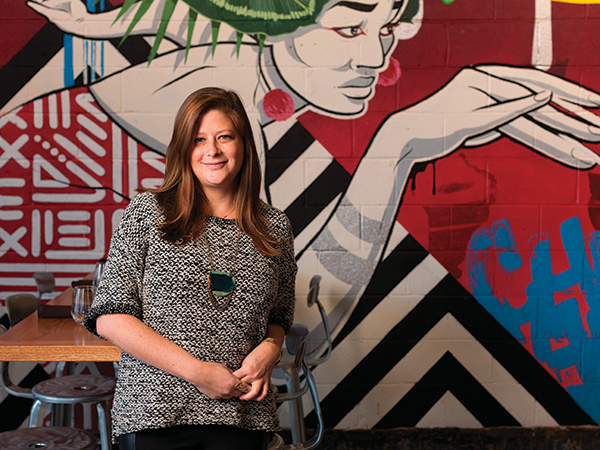
Cara Leepson at Palette 22 in front of the mural "Amazon Love Letter" by artist Cita Sadeli, aka CHELOVE.
Cara Leepson, Palette 22
Art director isn’t a position you’d expect to see on a restaurant payroll—not any more than you’d expect to have a painter dabbing on a canvas next to your table while you’re nibbling on Moroccan-spiced lamb ribs and fried watermelon with halloumi. And yet you’ll find all of those things at Palette 22, which opened in The Village at Shirlington in February, in the former Extra Virgin space.
The unusual format—which combines an artists’ studio and gallery with a 168-seat café—comes from Alexandria Restaurant Partners and replicates a similar venture by the same owners in Orlando. In Shirlington, art director Cara Leepson’s job is to curate works worthy of display on the restaurant’s cinderblock and plywood walls. Selected local artists agree to a three-month “residency” during which they make art onsite, two shifts a week.
Leepson, 29, grew up in Middleburg (her mother was a painter), earned a degree in studio art from Lynchburg College, and interned at the Ralls Collection in Georgetown, the Smithsonian American Art Museum (Renwick Gallery) and the Redux Contemporary Arts Center in Charleston, South Carolina. In 2011, she earned a graduate degree in art and museum studies from Georgetown University and interned at the Hirshhorn in Washington. Those experiences led to a job at Glenstone, the renowned contemporary art museum in Potomac, Maryland.
At Palette 22, Leepson’s first commission was JD Deardourff’s bold, neon, comic-book-like vinyl images, which covered the restaurant’s windows during construction. She then filled 14 artist slots, including two muralists (check out the bathrooms!) from 56 submissions.
Now what? “The best-case scenario is the worst case—that we sell everything off the wall right away and I have to replace it,” she says. Notable works in the inaugural mix include Jennifer Lillis’ stunning black-and-white block prints; Mills Brown’s digital print pen-and-ink collages; and Lizzy Lunday’s zombie oil portraits.
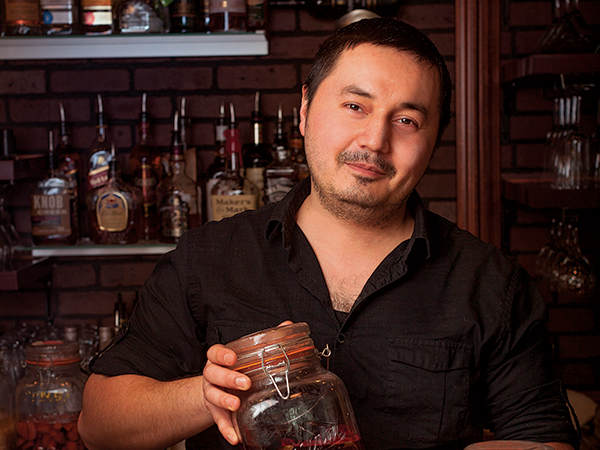
Ibrokhim Rakhmatullaev at Rus Uz
Ibrokhim Rakhmatullaev, Rus Uz
Growing up, Ibrokhim Rakhmatullaev wanted to be a diplomat. While that plan never materialized, he is most certainly an ambassador for the cuisine of his family’s homeland, Uzbekistan. At 30, he runs Rus Uz, the Ballston restaurant his father, Bakhitiyor, a chef, opened in 2012.
“I’ve been cooking since I was 6 years old,” says Ibrokhim, who often doubles as sous-chef, though his title is manager. “I even taught myself how to make sushi and Italian food, which I love. The only thing that is hard for me is plov,” he confides, referring to Uzbekistan’s national dish, an aromatic pilaf made with lamb, cumin, chickpeas, turmeric and raisins that takes four hours to prepare. Rus Uz sells 30 pounds of it a day.
The elder Rakhmatullaev was a chef in Uzbek embassies all over the world (with tours in Germany, France, India and the U.S.) before he opened Rus Uz. Ibrokhim earned undergraduate and graduate degrees in international economics and business in his native Tashkent, but there was never any question that he would help his father achieve his dream of owning a restaurant.
Over time, he has acquired skills in personnel management, public relations, supply-chain management (he does all of the restaurant’s ordering), banking and bartending. He even makes his own vodka infusions—50 of them. (The one made with fresh horseradish kills in a Bloody Mary.)
You’ll find him on the floor during lunch and dinner. Before and between meal services, he helps his father prep (but not assemble) the plov, manti (lamb dumplings), lagmon (beef noodle soup), borscht, samsa (triangular lamb and onion pastries) and galuptsi (stuffed cabbage). He has also become quite adept at breaking down the three whole kosher lambs that the kitchen goes through daily.
“My father always says: ‘If someone else can do it, why can’t you do it?’ ” Indeed.
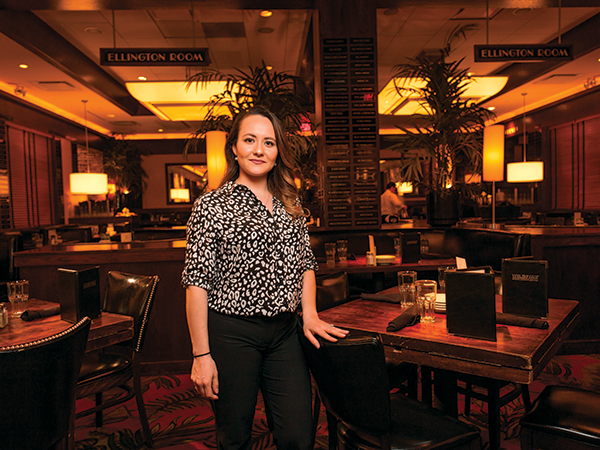
Erika Rios Mounts at Wildfire
Erika Rios Mounts, Wildfire
To say that Erika Rios Mounts has stamina is an understatement. The 32-year-old commutes an hour-and-a-half each way, from Waynesboro, Pennsylvania, to her job as culinary events manager for Wildfire in Tysons Corner. In the restaurant’s six private dining spaces, she run events all day and into the night. In between, she sets up off-site functions, presents at events like the MetroCooking DC show and even does cooking demos. “I don’t shy away from a challenge,” she says. “If they want me to show people how to cook on TV, I’m going to do it.” Last year she made prime rib hash for Father’s Day on WUSA Channel 9 and eggs Benedict for Easter on NewsChannel 8.
Rios Mounts says her work ethic was instilled at an early age. When she was 3, her family emigrated from Mexico City to Cicero, outside of Chicago. At the time, the neighborhood—long home to Polish and Italian families—was transitioning with the arrival of Mexican families and there were tensions. Rios Mounts witnessed two drive-by shootings growing up.
“My parents kept me away from bad influences. I wasn’t allowed to go to after-school activities, but they let me work,” she says. At 13, she lied about her age and got a job at McDonald’s, where she was eventually offered a management position. She couldn’t accept it because she was only 15.
After high school, Rios Mounts took a series of jobs (hostess, restaurant and bar manager, bank cashier, payroll clerk), but in 2007, she decided it was time for a change. She wound up in Vienna, Virginia, where a friend lived, and soon heard that Wildfire, a Chicago-based company, was opening a new steakhouse. She took a job as a server and worked her way up.
“I want to help Wildfire grow and flourish,” she says. “We topped all the other outlets in sales last year. I want to do that every year now.”
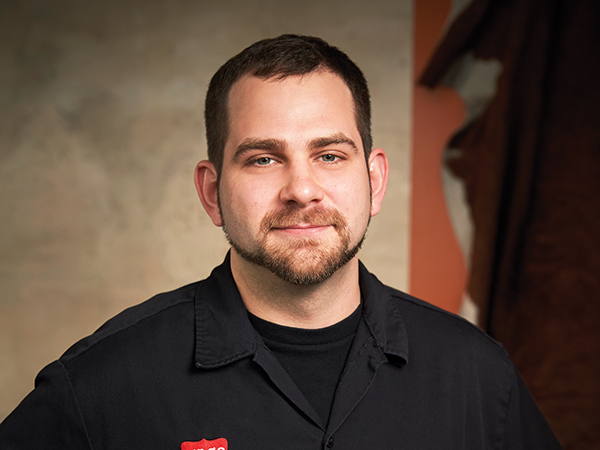
Tom Hall
Tom Hall, Taco Bamba Taqueria
Star chef Victor Albisu is the face of the wildly successful Taco Bamba Taqueria in Falls Church, but the guy in the trenches is Tom Hall. As the restaurant’s on-site chief, Hall rolls into work around 9 a.m. and works on production—making fresh pico de gallo, guacamole and morita sauce, or creating specials such as a tostada of Iberico pork (from Spanish free-range, acorn-fed pigs) al pastor. Then he heads out on catering deliveries, setting up build-your-own-taco bars in office buildings and other venues.
Hall, 30, graduated from the Culinary Institute of America, Hyde Park, in 2006 and took a cooking job at DC Coast in the District (now closed), where Albisu was the chef. The two hit it off, and when Albisu opened Del Campo in Penn Quarter in 2013, he tapped Hall to become its chef de cuisine. That opened up Albisu’s schedule so he could concentrate on Taco Bamba, which opened only a few months later.
“Once we got Del Campo going, Victor and I discussed expanding Taco Bamba, with me overseeing all the locations,” Hall says. “I went there in 2015. Organization, training, getting systems in place, developing the recipes so the consistency is there—these are the things I like to do. I’m a behind-the-scenes guy and that’s just fine by me.” Soon, Taco Bamba will open additional taquerias in Springfield and Vienna.
Meanwhile, the two are kicking around a few other ideas—including Bamba-Q, a move that would introduce barbecue to the Taco Bamba menu.
“The barbecue thing caught fire in me years ago [when I was] working for a chef who was really into it,” Hall says. “I like to put brisket on the menu, dry-rubbing it, then grilling and slow-roasting it for tacos to get those charred flavors that we like.”
He foresees a long future with Albisu.“It’s nice to work for a chef who lets you be who you are. Hopefully we’ll be running a lot of Taco Bambas together.”
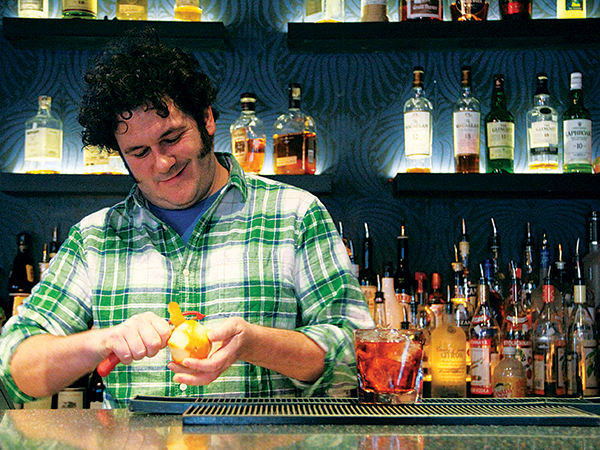
Evan Labb at Evening Star Café
Evan Labb, Evening Star Café
Evan Labb is the first to admit that he was green when he started out at Evening Star Café. In fact, he says, he was the worst server ever.
His first encounter with the restaurant was serendipitous. When he and his (now) fiancée, Courtney Fyfe, moved to Del Ray from Connecticut in 2005, they decided to celebrate at the place nearest to them. The next day, he applied for a job at the spot where they had dined the night before. He had no experience, but the owners gave him a shot.
“The chef explained a special one night and I raised my hand and asked what a shallot was,” says Labb, now 36. “Everyone laughed at me. After a month, the manager said I could either go through retraining or leave.”
Taking the first option, he started over from scratch, learning the roles of busser and host, in addition to the extensive food and drink knowledge that the restaurant demands of its waitstaff. It wasn’t long before he graduated from lunch to dinner shifts.
At the end of 2005, Evening Star’s head bartender put in his notice. To prove his mettle, Labb asked for two months to prove himself worthy of that post, volunteering four hours after each nightly wait shift to shadow the mixologist.
“There were no other candidates, so I was the best one for the job,” jokes Labb, whose dedication and congeniality earned him a 2015 RAMMY award for “Restaurant Employee of the Year.”
As a barkeep, he has developed his own bag of tricks. He buys candy out-of-pocket and gives away copious amounts (though he is stingy about revealing the source of his exceptional gummy bears). He even recommends pairings, depending on what customers like to drink. “A Reese’s goes well with a bold red wine. It’s amazing how a peanut butter cup can brighten someone’s day,” he says.
“Evan is a throwback, the bartender who is a buddy, a confidant and an entertainer,” says Michael Babin, owner of the Evening Star’s parent company, Neighborhood Restaurant Group. “He makes new guests feel like regulars. He’s, well, Evan-escent!”
Another Labb trademark? Adult arts-and-crafts projects that clearly appeal to the nostalgic sensibilities of a certain demographic.
The night before Thanksgiving, for example, he engaged regulars in tracing and lavishly decorating construction-paper hand turkeys with sequins, feathers, stickers and other adornments, displaying their work like a proud parent. Similar creative sessions have produced valentines, Easter eggs and gingerbread houses.
“People love doing things they haven’t done since they were 8,” he says. “Especially over cocktails.”
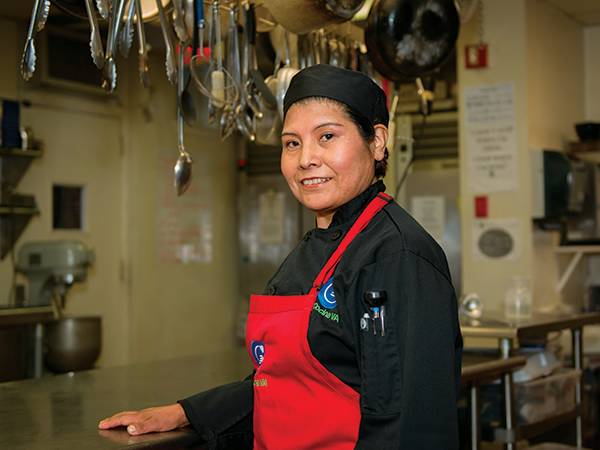
Gloria Cuevas at the Westin Arlington Gateway
Gloria Cuevas, Westin Arlington Gateway
If you’ve ever had a breakfast or lunch meeting at the Westin Arlington Gateway, it’s likely that Gloria Cuevas prepared the scrambled eggs and waffles for your morning buffet, or the Cobb salad and crème brûlée you enjoyed in the afternoon. Cuevas, 45, left her native Peru 15 years ago and came to Arlington in search of a better life. But a language barrier limited her initial job prospects to part-time work that didn’t pay the bills.
Soon, Cuevas found herself pregnant and in an abusive relationship. She lost the baby, fell on hard times and finally reached out to Sullivan House, an emergency shelter in Arlington that offered her temporary housing, food, emotional support and English classes. She left her boyfriend and took work wherever she could get it, always drawn to her childhood passion: cooking.
“My family talked about food all the time,” she says, looking back on her upbringing. “Especially my father. He made a game out of it, cutting out recipes from the newspaper or getting them from cooking shows on TV. Then he’d make them his own way, with what we had on hand. He was very creative. This gave me passion, which is the most important ingredient in any dish.”
Realizing that education was her ticket to advancement, Cuevas found her way to La Cocina VA, a local nonprofit that helps Hispanic immigrants find jobs in the food-and-hospitality business.
In February 2015, she entered a 13-week program focusing on culinary arts, vocational English and life-and-employment skills. She also acquired a ServSafe food handling certification from the National Restaurant Association. Whole Foods Market in Clarendon invited her for a one-month paid internship. Then the Westin Gateway offered her a full-time position as a line cook. She started working there in July.
“This is the first time in my life I’ve ever had medical insurance,” says Cuevas, who makes $15.30 an hour, plus benefits. She hopes one day to open her own catering business specializing in Peruvian food, such as pollo al horno (cumin-scented roast chicken), chupe de camarones (seafood chowder) and ceviche.
David Hagedorn is the dining columnist and restaurant critic for Arlington Magazine and Bethesda Magazine. He is currently writing the cookbook Rasika: Flavorful Recipes From a Groundbreaking Indian Restaurant.
